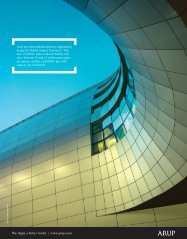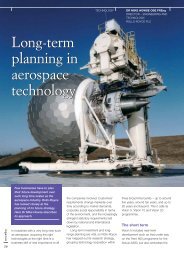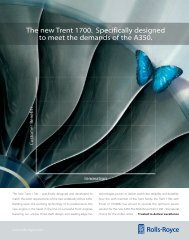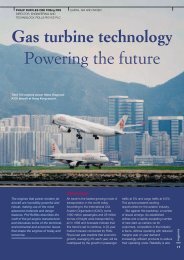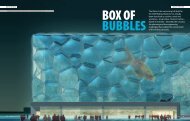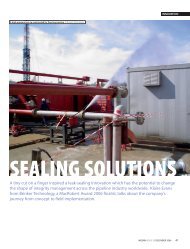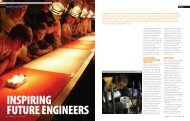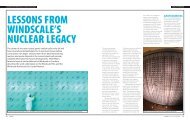Thousands of UK schools are now running after-school ... - Ingenia
Thousands of UK schools are now running after-school ... - Ingenia
Thousands of UK schools are now running after-school ... - Ingenia
You also want an ePaper? Increase the reach of your titles
YUMPU automatically turns print PDFs into web optimized ePapers that Google loves.
AFTER-SCHOOL CLUBS<br />
SOCIETY<br />
CARBON ZERO<br />
Four years ago Cathie Serrao, Head <strong>of</strong> Science at Queens’ School,<br />
a sports and science college in Hertfordshire, identified a need to<br />
raise the pr<strong>of</strong>ile <strong>of</strong> STEM subjects in her <strong>school</strong>. This led to a bid for<br />
funds for an eco-project to build an outdoor classroom to promote<br />
STEM subjects. Both Cathie and Sue Taplin, a Design & Technology<br />
teacher and a Forest School Leader, ran a club called ‘Carbon Zero’<br />
for Year 8 pupils, which engaged students in various aspects <strong>of</strong> the<br />
environment. The club members constructed the outdoor shelter;<br />
it involved groups <strong>of</strong> 16 pupils at a time, the majority girls, in<br />
lunchtime and <strong>after</strong> <strong>school</strong> sessions.<br />
Now that the classroom is finished it has become home<br />
to a range <strong>of</strong> other clubs including a Year 8 Engineering Club<br />
and ‘i:Wood’. The sessions incorporate STEM subjects through a<br />
culmination <strong>of</strong> various holistic teaching methods; exploration<br />
through playful experiences, managing risk with a student-led focus<br />
and time for reflection on learning. Serrao, says the whole project<br />
has resulted in a massive increase <strong>of</strong> interest in STEM including a<br />
50% increase in the take up <strong>of</strong> A- level Science and Product Design.<br />
on engineering activities and<br />
opportunities for students to<br />
meet young, working engineers,<br />
attracts over 100,000 visitors<br />
annually.<br />
MEASURES OF<br />
SUCCESS<br />
From the bath bombs <strong>of</strong> St<br />
Boniface’s College to the model<br />
cyclotron at Orangefield High<br />
School, Belfast, our survey has<br />
found that whether a club is<br />
successful or not from the pupils’<br />
perspective seems to depend<br />
primarily on the confidence and<br />
commitment <strong>of</strong> the teacher or<br />
club leader and the support they<br />
can muster from local engineers<br />
and sponsors. From a national<br />
perspective, whether the <strong>after</strong><strong>school</strong><br />
club model is successful<br />
or not depends not just on the<br />
activities and their relevance<br />
to the real world, nor with the<br />
number <strong>of</strong> pupils attending and<br />
their app<strong>are</strong>nt enthusiasm, but<br />
on whether the clubs make any<br />
real difference to the way pupils<br />
think about STEM.<br />
There is plenty <strong>of</strong> supporting<br />
evidence to show that these<br />
clubs do indeed make an<br />
impact. Some club leaders<br />
quoted figures <strong>of</strong> 50% increased<br />
take-up <strong>of</strong> A-level Science and<br />
Product Design, which must be<br />
a positive short term indicator.<br />
Above all, though, the<br />
value <strong>of</strong> <strong>after</strong>-<strong>school</strong> clubs<br />
that have a technical bias<br />
appears to lie in the increased<br />
motivation <strong>of</strong> the pupils and<br />
teachers towards a common<br />
understanding, firstly <strong>of</strong><br />
engineering as a function, and<br />
secondly <strong>of</strong> engineering as a<br />
c<strong>are</strong>er. The active involvement<br />
<strong>of</strong> major industry must also<br />
Students at Queens’ School laying the wood chippings for the path that<br />
leads to the outdoor classroom shelter<br />
play a role. The opportunity<br />
to strengthen the traditional<br />
model <strong>of</strong> engineering clubs<br />
to include programming skills<br />
could yet see a further step<br />
up in interest and numbers<br />
across the country. Maltby<br />
Academy, whose girls have<br />
been developing projects for<br />
people with disabilities and<br />
who have <strong>now</strong> set up their<br />
own company and <strong>are</strong> talking<br />
to manufacturers, is surely an<br />
exemplar. There is no more<br />
powerful outcome that <strong>after</strong><strong>school</strong><br />
engineering clubs could<br />
deliver than to stimulate the<br />
entrepreneurs <strong>of</strong> tomorrow.<br />
Good progress has been<br />
made. Now we must promote<br />
the key ingredients for success in<br />
<strong>after</strong>-<strong>school</strong> clubs: incorporating<br />
sponsorship from industry,<br />
the integration <strong>of</strong> s<strong>of</strong>tw<strong>are</strong><br />
programming and a focus on<br />
entrepreneurial skills.<br />
BIOGRAPHY<br />
Anna Paczuska is an education researcher and writer. She<br />
taught mathematics and numeracy at <strong><strong>school</strong>s</strong> and colleges<br />
in inner London and then managed a series <strong>of</strong> wideningaccess<br />
initiatives including a BP-funded Access to Science<br />
and Maths project. She was Head <strong>of</strong> Access and Widening<br />
Participation at London South Bank University.<br />
The opportunity to strengthen the<br />
traditional model <strong>of</strong> engineering clubs to<br />
include programming skills could yet see<br />
a further step up in interest and numbers<br />
across the country.<br />
<strong>Ingenia</strong>’s Editor-in-Chief would<br />
like to thank the following<br />
<strong><strong>school</strong>s</strong> for responding to the<br />
magazine’s appeal for <strong>after</strong><strong>school</strong><br />
clubs information.<br />
Their input allowed a range<br />
<strong>of</strong> practical experiences to be<br />
included in this article.<br />
Thanks to: Notre Dame Roman<br />
Catholic School, Plymouth; The<br />
Glasgow Academy; St Boniface’s<br />
College, Plymouth; Langley<br />
Park School for Boys, London;<br />
King’s School in Macclesfield;<br />
Orangefield High School,<br />
Belfast; Appleton Academy,<br />
Bradford; Ralph Allen School,<br />
Bath; Framwellgate School<br />
Durham; Guiseley School, Leeds;<br />
Nova Hreod School, Swindon;<br />
Bury Grammar School for<br />
Girls; Keswick School; Keswick<br />
Thorpe Hall School; Thorpe Bay<br />
Hanham High School, Bristol;<br />
Cottingham High School, North<br />
Humberside; Bishop’s Stortford<br />
College; Bishop’s Hatfield Girls’<br />
School; Dame Alice Owens<br />
School, Potters Bar; Maltby<br />
Academy, Rotherham; Portslade<br />
Aldridge Community Academy,<br />
Brighton; Friern Barnet School,<br />
North London; Ernesford Grange<br />
Community College a Science<br />
Specialist School, Coventry;<br />
The King’s School, Canterbury;<br />
Queens’ School, Hertfordshire;<br />
Alperton Community School,<br />
London; Witton Park High<br />
School, Lancashire and South<br />
Camden Community School,<br />
London.<br />
AWARD WINNERS<br />
The STEM Club at Framwellgate School Durham was started four<br />
years ago for pupils at Key Stage 3. The club <strong>now</strong> has 75 members,<br />
including some year 10 pupils who were part <strong>of</strong> the original cohort<br />
and enjoyed it so much that they did not want to leave. Enterprise<br />
and STEM Enrichment Manager Catherine Purvis-Mawson<br />
expanded the club to allow these older pupils positions <strong>of</strong> greater<br />
leadership, managing project teams <strong>of</strong> younger pupils. She is also<br />
developing an internship programme for sixth form students to<br />
experience real-world placements in science and engineering.<br />
Some <strong>of</strong> the club’s activities include building a glider and<br />
developing experiments to test its aerodynamic efficiency and<br />
constructing devices based on electric circuits to improve the life<br />
<strong>of</strong> people with disabilities. Last year, the club organised a <strong>school</strong>wide<br />
design competition for applications <strong>of</strong> ‘smart’ materials<br />
in clothing, including Kevlar, thermographic, and UV-sensitive<br />
materials, culminating in a catwalk show with the announcer<br />
explaining the engineering principles behind each garment.<br />
This year, club members <strong>are</strong> collaborating with a partner <strong>school</strong><br />
in Jordan to design systems to conserve, re-use, and recycle water<br />
in the desert.<br />
Last year, the club won the Young Engineers’ problem-solving<br />
award at last year’s Big Bang Fair, and a STEMNET award for being<br />
‘the most dedicated club’. As a prize, five pupils will be travelling to<br />
CERN in Switzerland in March 2012.<br />
Students from Framwellgate School Durham wear the clothes that they<br />
made from ‘smart’ materials<br />
6 INGENIA INGENIA ISSUE 50 MARCH 2012 7



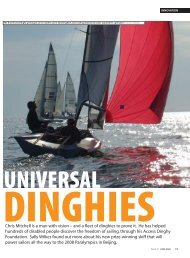
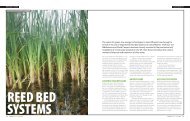
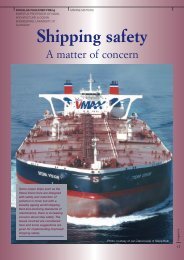

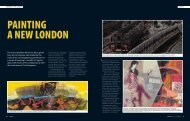
![[322/03] Francke - Ingenia](https://img.yumpu.com/23411337/1/184x260/322-03-francke-ingenia.jpg?quality=85)
